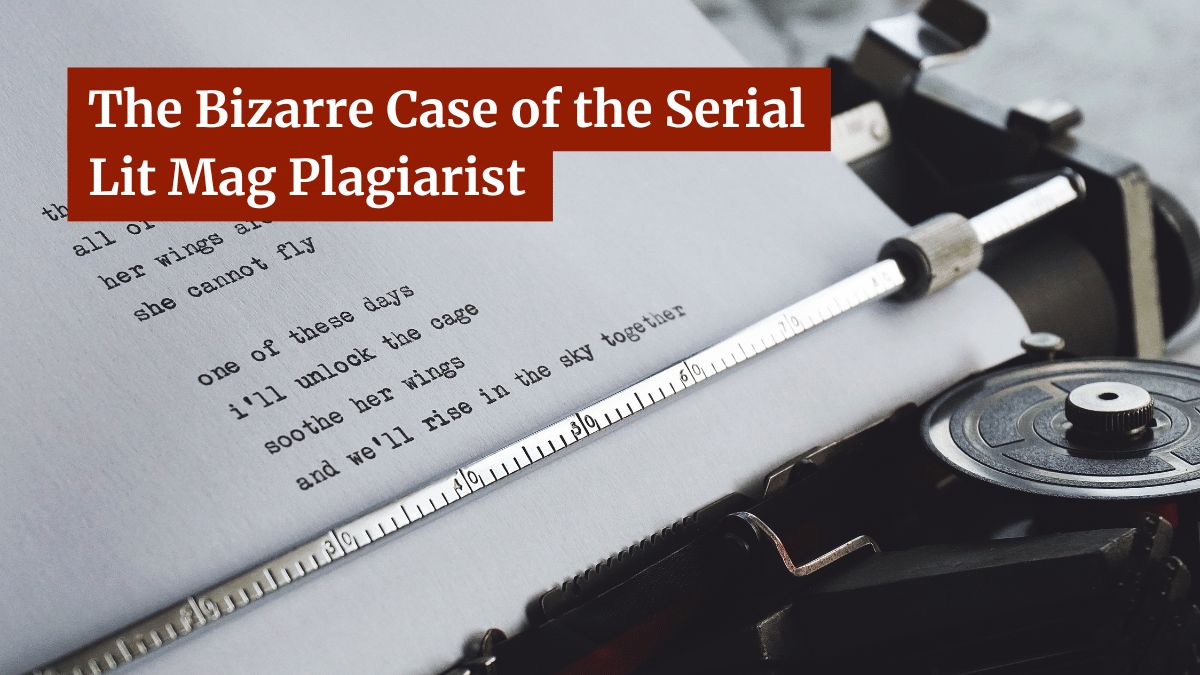The Bizarre Case of the Serial Lit Mag Plagiarist

For the past few weeks, the literary magazine/small publishing community has been abuzz with the pseudonym John Kucera, a serial plagiarist who has, over the past few years, had dozens of plagiarized works published in various contests and publications.
The story, or at least the public-facing story, began on January 16 when author and editor Wendy N. Wagner posted on her Bluesky Account that she had notified 7 different editors who had published work by Kucera.
She further encouraged other editors to check if they had any submissions from the author.
Check they did and soon it became very clear just how widespread Kucera’s plagiarism actually was. To highlight a few examples.
- Academy of the Heart and Mind pulled three poems of his from December 2023.
- Bending Genres added a note to an October 2023 submission from Kucera.
- Friends Journal removed an August 2023 submission and altered the author note.
- Utopian Fiction announced they had published a plagiarized work by him.
- Philadelphia Stories announced they had been duped and removed the stories.
- The Gork Gazette removed one poem of his and altered the author description.
- Moon City Review had to halt printing of their 2024 edition.
- And the list of publications and victims simply kept growing from there.
The story was featured heavily in the Lit Mag News, with a follow up the next week highlighting even more instances of plagiarism. In all the cases, the poems or stories were word-for-word copies of earlier works, with some of the works being recent while others dated back to 1913.
While it is unlikely that we will ever know the full extent of Kucera’s plagiarism, what makes this case bizarre is that it doesn’t appear to have stopped.
One journal reporter that they received another submission AFTER they had already confronted him about his earlier plagiarisms.
And, as recently as today, other magazines have reported new submissions by Kucera that were, once again, verbatim plagiarism of an earlier work.
In short, Kucera has not been deterred in any meaningful way despite being a pariah among both editors and authors of the literary magazine scene and, most likely, he still may find publications willing to publish his “work”.
This is even after Submittable, the platform Kucera uses to submit to literary magazines and journals, has closed three accounts affiliated with him. However, he still seems undeterred and it’s likely that his submissions will continue to land in editors’ inboxes, with at least some being unaware of his reputation.
All this raises a simple question: What can be done to stop Kucera and others like him? The answer is remarkably simple.
The Blind Spot Kucera Exploited
Note: John Kucera is, by all accounts, a pseudonym. There are several real people with that name, including some prominent figures, that do not appear to have any connection with this rendition. There have been many posts claiming to contain Kucera’s real name, there seems to be at least some uncertainty and even less proof of his identity. As such, I’ll be using Kucera through this post but wish to separate him from the real humans who have the misfortune of sharing the name.
One of the biggest concerns is that, since Kucera is a pen name, he could simply create a new name, set up new accounts on Submittable and then keep going as if nothing happened at all.
That, unfortunately, is very true. Given the anonymous nature of these submissions and the fact that it is not out of the ordinary for literary magazine publications, there’s not much stopping Kucera from returning.
The reason is simple: Kucera exposed and exploited a deep flaw in the literary magazine system.
Most literary magazines, in particular online ones, are not professional operations. They are edited and managed by volunteers who are doing the work in their spare time and with extremely limited budgets.
Because of this, there is a limited focus on checking incoming works for plagiarism. Most literary magazines feel that, given how low stakes the industry is in general, that there’s no real reason to spend the time and resources checking work for ethical issues.
However, that is something that my personal experience shows to not be the case.
I first became involved in plagiarism back in April 2002. I was a poet and author publishing work online to a small but growing audience. However, that was when I learned that my work had been plagiarized heavily on another site, prompting my first battle with plagiarism.
After starting regular checks for my work, I found another 700 plagiarists. These included plagiarists who had created sites, submitted my work to forums and many who had submitted them to literary magazines, both print and online. It was that rampant plagiarism that led to the founding of this site in 2005.
Now, more than 20 years later, that blind spot still exists. And that is incredibly frustrating because, ultimately, it’s an easy issue to address. One just needs to be aware of it and be willing to take proactive measures to stop it.
Preventing the Next (or Current) Kucera
There’s really no secret to preventing plagiarists like Kucera. In fact, several editors, including the editor of Identity Theory, have already mentioned it as a simple solution: Check for plagiarism in poems and stories before hitting publish.
The process of doing so doesn’t have to be very complicated. It can be as simple as taking a line or two from a piece and searching for it in Google.
While this won’t help you detect more nuanced plagiarism or plagiarism with heavy rewriting, with Kucera (and indeed the plagiarists I saw of my work) the works were taken wholly verbatim.
Though no editorial process can prevent 100% of all plagiarism or all types of plagiarism, there are simple steps that can be taken to prevent the most egregious and the most flagrant plagiarism from making it into print.
Taking those steps proactively can go a long way. However, that means acknowledging that plagiarists will be submitting work to you and that publications, or rather their editors, have an obligation to try and prevent that plagiarism from being printed.
However, the issue that Kucera highlighted goes beyond that. No matter what checks are in place for plagiarism, it is likely and even inevitable that some will get through and the record will need to be corrected. Even if the issue isn’t plagiarism, it could be a problematic author, an issue of fabrication in a non-fiction work or it could be that the author simply wants the work removed.
Kucera exposed that literary magazines do not have a consistent way of handling those situations. Some of the publications that published Kucera’s publication deleted the poems outright, others left the work up (in whole or in part) and appended and editor’s note, still others edited the author information and others used social media to communicate what had happened.
Much of the differences is because magazines aren’t the same. They use differing combinations of online and print publication for distribution and their audiences interact with them in differing way.
Still, if we glance at academic publishing, we see more a more standardized process for handling integrity issues. There are even organizations like COPE that provide publishers guidance on what action is approrpriate in a given situation. To be clear, this system is far from perfect and, as my recent article on plagiarism euphemisms highilghts, many publishers still struggle taking corrective action. However, it is still far more standardized than what we see in literary magazines.
In the end, it’s important to not just discuss methods of preventing plagiarism in literary magazines, but ways to respond to integrity issues of all types when they are discovered.
Bottom Line
Even though I am frustrated, I actually have a great deal of sympathy for the editors of these small publications.
As I said above, they are largely volunteers working very hard to publish these magazines on a very small budget. These are genuine passion projects made by people who love that type of literature for others who feel the same way.
But, as this case has shown, these pubilcations risk providing a platform to plagiarists, including flagrant and repeat ones. While it’s impossible to know how long Kucera has been publishing or how many publications are impacted, we know that it’s been many months and dozens of publications.
Given how flagrant Kucera’s plagiarism has been, there’s no excuse for that. Kucera isn’t a crafty plagiarist carefully rewriting other people’s work or using AI to generate “original” poetry, he’s a copy and paste plagiarist who, at times has copied works over a hundred years old.
The tools and approaches to detecting this kind of plagiarism have been around for decades and this type of issue should, largely, be a thing of the past. While I agree author Melissa E. Jordan that, “It just doesn’t seem the most lucrative grift,” plagiarists don’t always need a reason to plagiarize and publications need to understand that.
If plagiarists were wholly logical people, they wouldn’t be plagiarists. That is something that editors of literary magazines need to take to heart.
Hat Tip: I want to say thanks to author F.I. Goldhaber for alerting me to this story.
Want to Reuse or Republish this Content?
If you want to feature this article in your site, classroom or elsewhere, just let us know! We usually grant permission within 24 hours.
